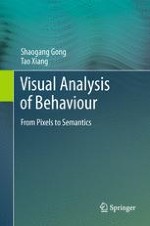2011 | OriginalPaper | Buchkapitel
8. Unsupervised Behaviour Profiling
verfasst von : Shaogang Gong, Tao Xiang
Erschienen in: Visual Analysis of Behaviour
Verlag: Springer London
Aktivieren Sie unsere intelligente Suche, um passende Fachinhalte oder Patente zu finden.
Wählen Sie Textabschnitte aus um mit Künstlicher Intelligenz passenden Patente zu finden. powered by
Markieren Sie Textabschnitte, um KI-gestützt weitere passende Inhalte zu finden. powered by
